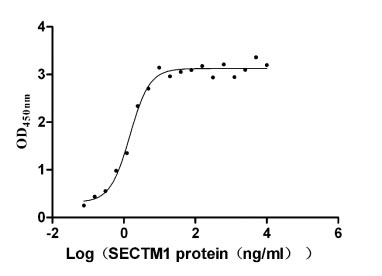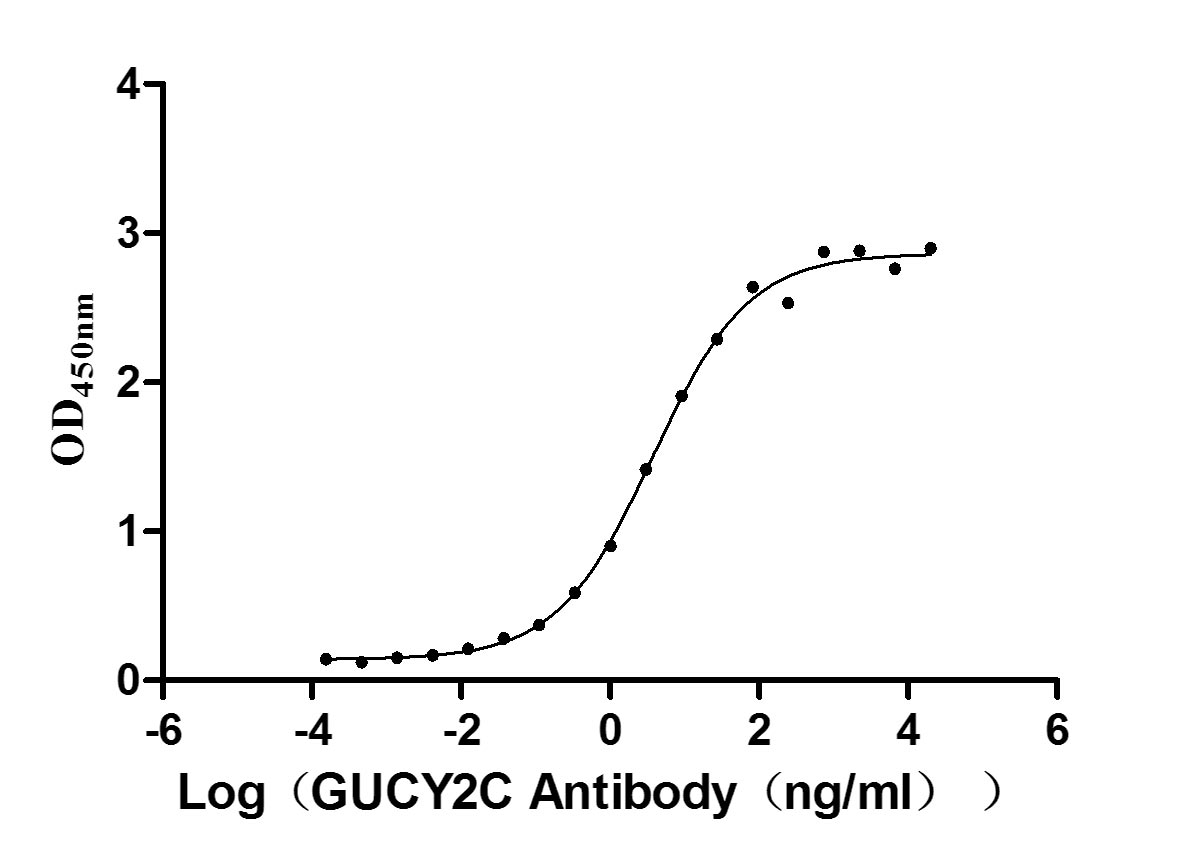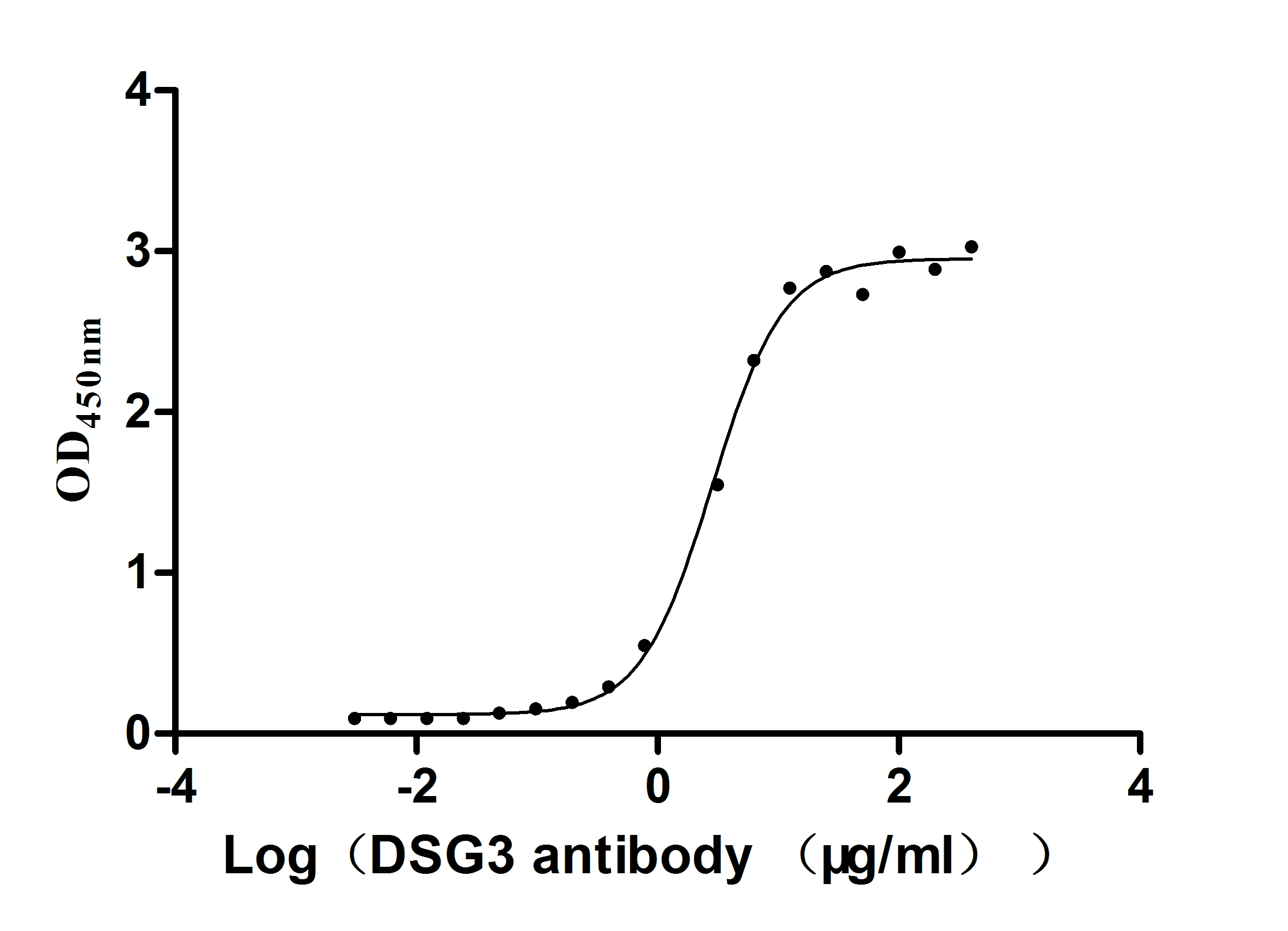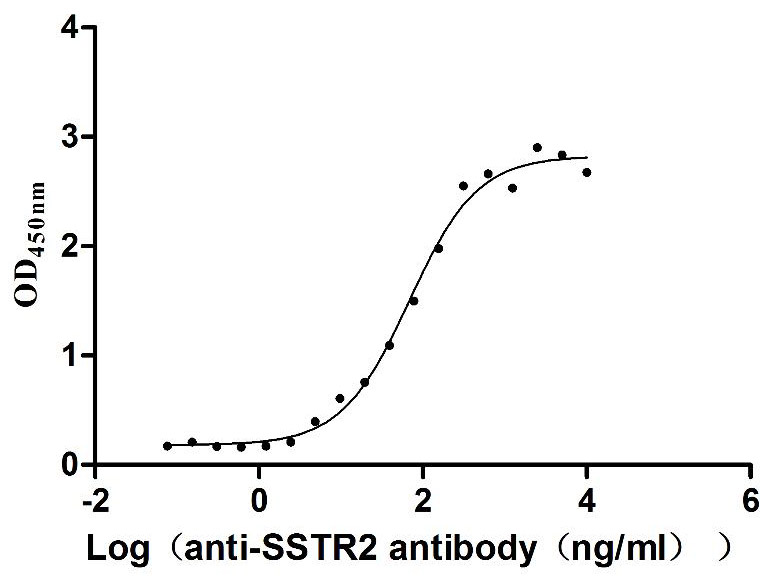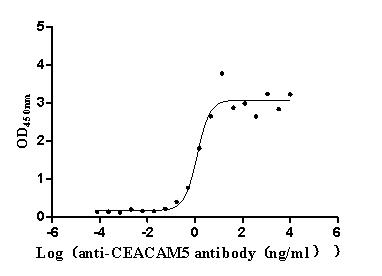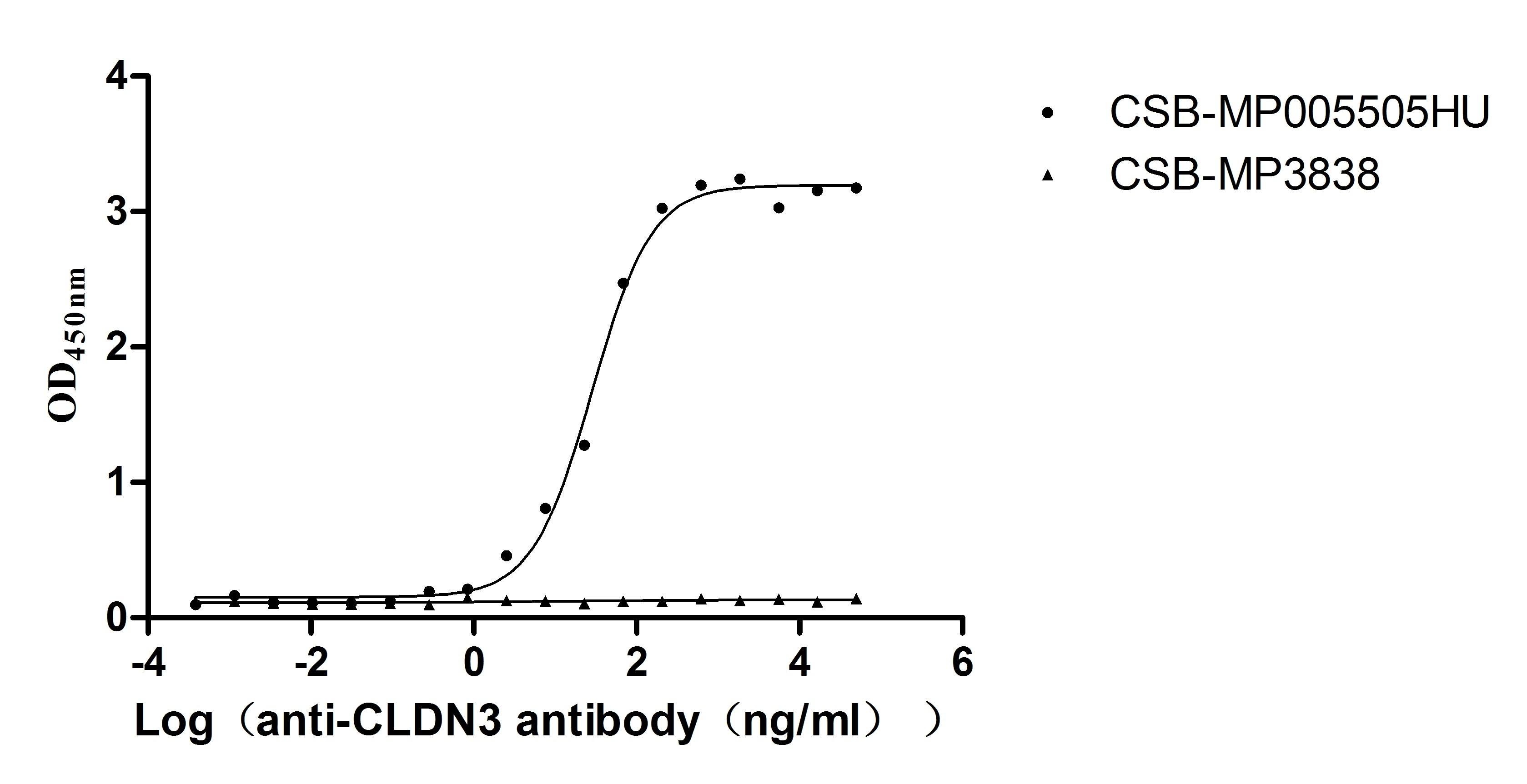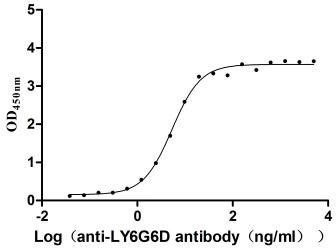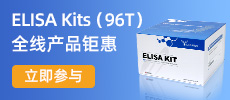Recombinant Mouse Solute carrier family 15 member 1 (Slc15a1), partial
-
中文名稱:小鼠Slc15a1重組蛋白
-
貨號:CSB-YP862370MO
-
規(guī)格:
-
來源:Yeast
-
其他:
-
中文名稱:小鼠Slc15a1重組蛋白
-
貨號:CSB-EP862370MO
-
規(guī)格:
-
來源:E.coli
-
其他:
-
中文名稱:小鼠Slc15a1重組蛋白
-
貨號:CSB-EP862370MO-B
-
規(guī)格:
-
來源:E.coli
-
共軛:Avi-tag Biotinylated
E. coli biotin ligase (BirA) is highly specific in covalently attaching biotin to the 15 amino acid AviTag peptide. This recombinant protein was biotinylated in vivo by AviTag-BirA technology, which method is BriA catalyzes amide linkage between the biotin and the specific lysine of the AviTag.
-
其他:
-
中文名稱:小鼠Slc15a1重組蛋白
-
貨號:CSB-BP862370MO
-
規(guī)格:
-
來源:Baculovirus
-
其他:
-
中文名稱:小鼠Slc15a1重組蛋白
-
貨號:CSB-MP862370MO
-
規(guī)格:
-
來源:Mammalian cell
-
其他:
產(chǎn)品詳情
-
純度:>85% (SDS-PAGE)
-
基因名:Slc15a1
-
Uniprot No.:
-
別名:Slc15a1; Pept1; Solute carrier family 15 member 1; Intestinal H(+)/peptide cotransporter; Oligopeptide transporter; small intestine isoform; Peptide transporter 1; Proton-coupled dipeptide cotransporter
-
種屬:Mus musculus (Mouse)
-
蛋白長度:Partial
-
蛋白標(biāo)簽:Tag?type?will?be?determined?during?the?manufacturing?process.
The tag type will be determined during production process. If you have specified tag type, please tell us and we will develop the specified tag preferentially. -
產(chǎn)品提供形式:Lyophilized powder
Note: We will preferentially ship the format that we have in stock, however, if you have any special requirement for the format, please remark your requirement when placing the order, we will prepare according to your demand. -
復(fù)溶:We recommend that this vial be briefly centrifuged prior to opening to bring the contents to the bottom. Please reconstitute protein in deionized sterile water to a concentration of 0.1-1.0 mg/mL.We recommend to add 5-50% of glycerol (final concentration) and aliquot for long-term storage at -20℃/-80℃. Our default final concentration of glycerol is 50%. Customers could use it as reference.
-
儲存條件:Store at -20°C/-80°C upon receipt, aliquoting is necessary for mutiple use. Avoid repeated freeze-thaw cycles.
-
保質(zhì)期:The shelf life is related to many factors, storage state, buffer ingredients, storage temperature and the stability of the protein itself.
Generally, the shelf life of liquid form is 6 months at -20°C/-80°C. The shelf life of lyophilized form is 12 months at -20°C/-80°C. -
貨期:Delivery time may differ from different purchasing way or location, please kindly consult your local distributors for specific delivery time.Note: All of our proteins are default shipped with normal blue ice packs, if you request to ship with dry ice, please communicate with us in advance and extra fees will be charged.
-
注意事項:Repeated freezing and thawing is not recommended. Store working aliquots at 4°C for up to one week.
-
Datasheet :Please contact us to get it.
靶點詳情
-
功能:Proton-coupled amino-acid transporter that transports oligopeptides of 2 to 4 amino acids with a preference for dipeptides. Primarily responsible for the absorption of dietary di- and tripeptides from the small intestinal lumen.
-
基因功能參考文獻:
- Results suggest that PepT1 contributes to maintain balance of homeostasis and proper functions in the small intestine, and dysregulated miRNAs and proteins along the crypt-villus axis are highly related to this process. PMID: 27250880
- Glycosylation of PEPT1 confers resistance against proteolytic cleavage by proteinase K, whereas a remarkable intrinsic stability against trypsin, even in the absence of N-linked glycans, was detected. PMID: 28336547
- We tested the hypothesis that PEPT2 genotypes affect the severity and prognosis of porphyria-associated kidney disease PMID: 28031405
- findings suggested a major role of PEPT1 in the intestinal permeability and oral absorption of 5-aminolevulinic acid PMID: 26444978
- Data (including data from studies in transgenic/knockout mice) suggest human PEPT1 and mouse PepT1 exhibit different affinities for antibiotic cefadroxil; these differences may account for species differences in intestinal absorption of cefadroxil. PMID: 26979860
- Crystal structures of the extracellular domain from PepT1 and PepT2 provide novel insights into mammalian peptide transport. PMID: 26320580
- miRNA-193a-3p can target colonic PepT1 and reduce intestinal inflammation. PMID: 25931122
- PEPT1 expression is reduced during intestinal inflammation and PEPT1 is not required for muramyl dipeptide-induced immune response. PMID: 24583477
- Data indicate that peroxisome proliferator-activated receptor-alpha (PPARalpha) activated the intestinal expression of Slc15a1 mRNA during the light period, and protein levels of PepT1 peaked before the start of the dark phase. PMID: 25016014
- JAK3 is a powerful regulator of the peptide transporters PEPT1 and PEPT2. PMID: 23934551
- PepT1 deletion reduced the area under the plasma concentration-time profile (AUC0-120) of cefadroxil by 10-fold, the maximum plasma concentration (Cmax) by 17.5-fold, and increased the time to reach a maximum plasma concentration (Tmax) by 3-fold. PMID: 23959853
- A critical role of intestinal PepT1 in improving the rate and extent of oral absorption for valacyclovir. PMID: 23924683
- PepT1 expressed in immune cells has an important role in promoting the immune response during experimentally induced colitis. PMID: 23797361
- These studies unequivocally demonstrate the presence of PEPT1 protein in healthy distal colonic epithelium in mice, rats, and humans and proved that the protein is functional and contributes to electrolyte and water handling in mice. PMID: 23660505
- Intestinal PepT1 has a major influence in improving the oral absorption of valacyclovir. PMID: 23264448
- The intestinal peptide transporter PEPT1 is involved in food intake regulation in mice fed a high-protein diet. PMID: 22031831
- Expression of PEPT1 protein in the small intestine was increased ~2-fold in wild-type mice during fasted as compared to fed conditions. PMID: 21904935
- PEPT1 is important for overall amino acid absorption only after high dietary protein intake when amino acid transport processes are saturated and PEPT1 can provide additional absorption capacity. PMID: 21350187
- Compared with wild-type animals, PEPT1 null mice exhibited a 78% reduction in glycylsarcosine uptake at pH 6.0 at 37 degrees C. PMID: 20862774
- Results from this study indicated that treatment with Lactobacillus plantarum may ameliorate colonic epithelial barrier dysfunction in IL-10 knockout mice, by modulating the apical junction complex and PepT1-mediated transport. PMID: 20884889
- Proton-coupled electrogenic dipeptide uptake in the native small intestine, mediated by PEPT1, relies on the negative apical membrane potential as the major driving force and contributes significantly to intestinal fluid transport. PMID: 20430876
- Pept1 mRNA was not only highly expressed in small intestine, but also detectable in gonads and large intestine of mice PMID: 16202478
- Treatment with interleukin-1beta increased PepT1 mRNA expression in mouse proximal and distal colon and decreased PepT1 mRNA expression in jejunum and ileum. PMID: 16328452
- In conclusion, the association of PepT1 with lipid rafts differently modulates its transport activity in polarized and nonpolarized cells. PMID: 17932227
- PEPT1 exhibits ectopic expression in colonic inflammation PMID: 18668438
- diet-induced obesity, that a 4-week hypercaloric diet resulted in a 46% decrease in PepT1-specific transport, because of a 30% decrease in PepT1 protein and a 50% decrease in PepT1 mRNA levels. PMID: 19144638
- Targeted disruption of PEPT1 gene in mice significantly reduces dipeptide absorption in intestine. PMID: 19434858
- Demonstrate a molecular mechanism underlying the regulation of colonic PepT1 expression and reveal a novel role for PepT1 in host defense via its capacity to modulate bacterial-epithelial interactions and intestinal inflammation. PMID: 19549526
顯示更多
收起更多
-
亞細胞定位:Membrane; Multi-pass membrane protein.
-
蛋白家族:PTR2/POT transporter (TC 2.A.17) family
-
數(shù)據(jù)庫鏈接:
Most popular with customers
-
Recombinant Human CD226 antigen (CD226), partial (Active)
Express system: Mammalian cell
Species: Homo sapiens (Human)
-
Recombinant Human T-cell antigen CD7 (CD7), partial (Active)
Express system: Mammalian cell
Species: Homo sapiens (Human)
-
Recombinant Human Heat-stable enterotoxin receptor (GUCY2C), partial (Active)
Express system: Mammalian cell
Species: Homo sapiens (Human)
-
Recombinant Mouse Desmoglein-3 (Dsg3), partial (Active)
Express system: Mammalian cell
Species: Mus musculus (Mouse)
-
Recombinant Human Somatostatin receptor type 2 (SSTR2)-VLPs (Active)
Express system: Mammalian cell
Species: Homo sapiens (Human)
-
Express system: Mammalian cell
Species: Homo sapiens (Human)
-
Recombinant Human Claudin-3 (CLDN3)-VLPs (Active)
Express system: Mammalian cell
Species: Homo sapiens (Human)
-
Recombinant Macaca fascicularis lymphocyte antigen 6 family member G6D (LY6G6D) (Active)
Express system: Yeast
Species: Macaca fascicularis (Crab-eating macaque) (Cynomolgus monkey)



